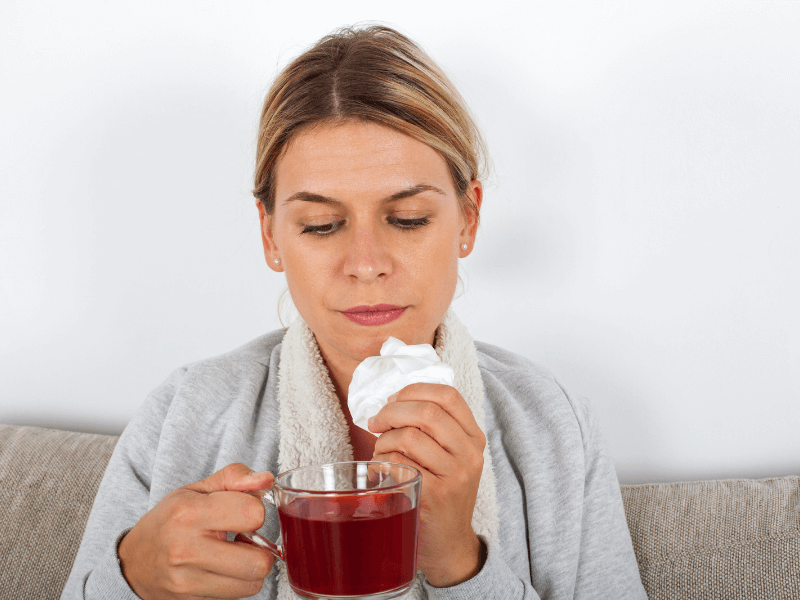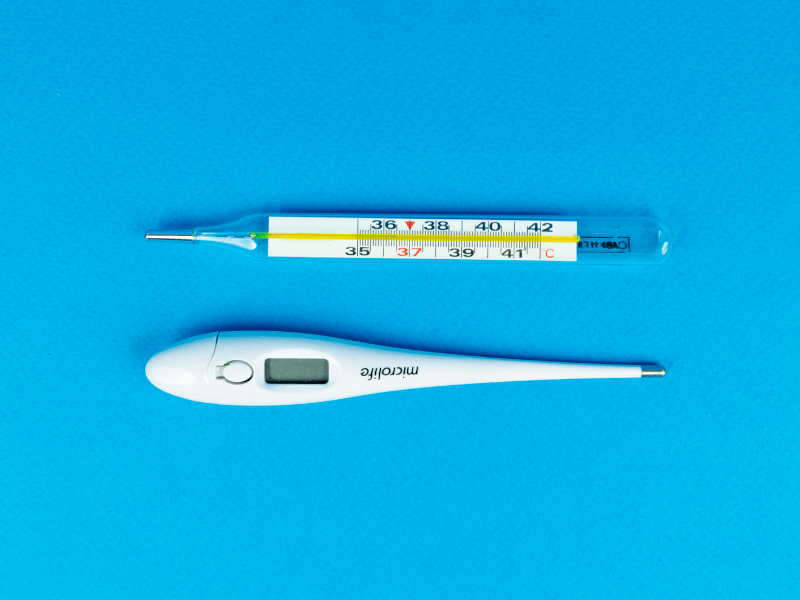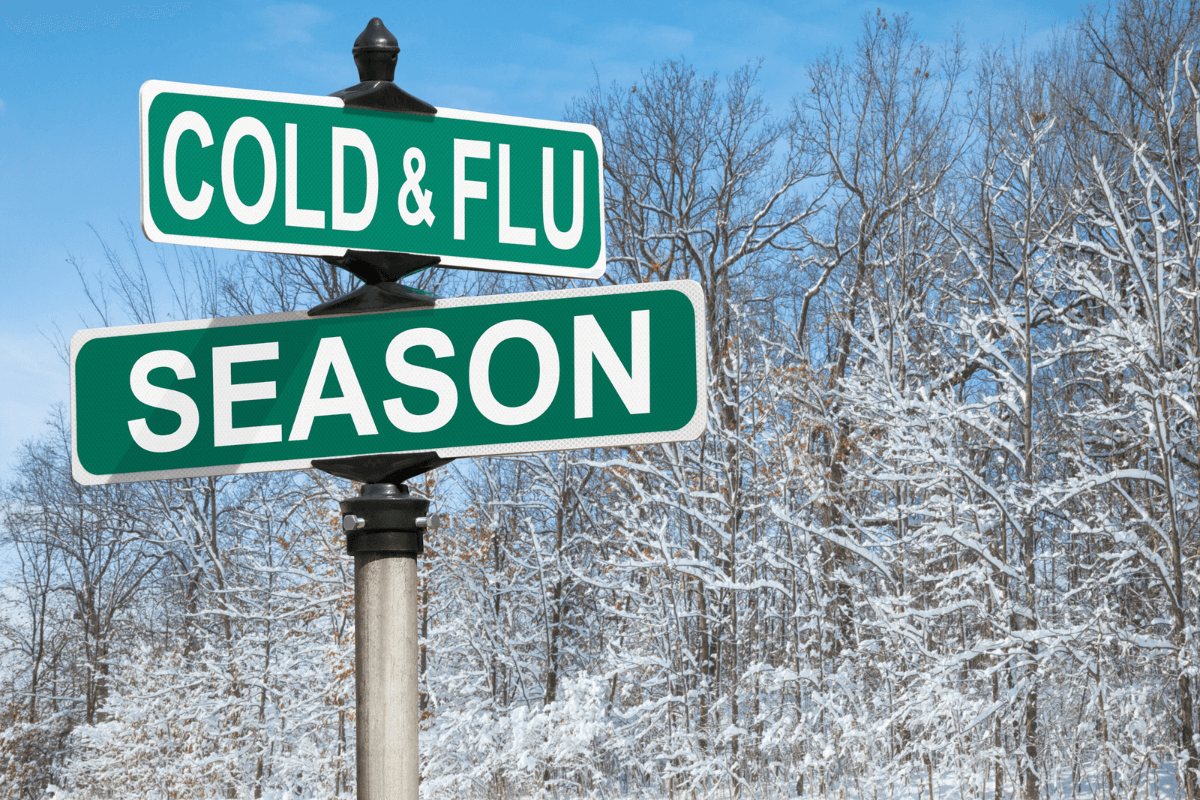How to Best Prepare for Cold and Flu Season This Year
By Randy Breneman on Wednesday, November 16, 2022Learn some of the most important steps to take to stay healthy and comfortable all season long. These are things that you won't want to put off!
If you’re like most people, you probably start getting a little worried about cold and flu season as the winter season rolls around. It’s definitely important to take precautions to protect yourself and your family from sickness, and to make sure your home is ready for the cold weather during this time of year.
If you are in the field service industry, you are sometimes in the homes of others and dealing with customers face-to-face. This can increase your risk of getting sick, which makes it that much more important to make sure that you take any and all precautions to stay healthy this season.
But don’t worry – by following these tips, you can be prepared and increase your chances of staying healthy all season long!
Get Your Flu Vaccine as Soon as It’s Available

As the weather gets colder, it’s time to start thinking about protecting yourself from the flu. One of the best ways to achieve this is to get vaccinated as soon as the vaccine is available.
According to the CDC, influenza (flu) vaccines are vaccines that protect against the four influenza viruses that research indicates will be most common during the upcoming season. Most flu vaccines are “flu shots” given with a needle, usually in the arm, but in some instances they are offered in the form of a nasal spray. The composition of flu vaccines has been updated for the 2022-2023 flu season.
Types of Flu Vaccines
The types of flu vaccines available include a standard-dose flu shot, a cell-based flu shot, a recombinant flu shot (Flublok Quadrivalent), an egg-based high-dose flu shot (Fluzone High-Dose Quadrivalent), an egg-based adjuvanted flu shot (Fluad Quadrivalent), and an egg-based live attenuated flu nasal spray vaccine (FluMist Quadrivalent). There are many flu vaccine options, but the most important thing to note is that for all people 6 months and older to get a flu vaccine every year.
Questions About Flu Vaccines
Each one of these flu vaccines are approved and recommended for different age groups so if you are curious about which one to get, take a closer look at them to see which best fits your needs. If you still aren’t sure and have further questions, talk to your doctor or health care professional. More information on approved flu vaccines for the 2022-2023 flu season, and age indications for each vaccine are available in CDC’s Table: U.S. Influenza Vaccine Products for the 2022-2023 Season.
Who Should and Who Should Not Get a Flu Vaccine
Everyone 6 months or older in the United States is recommended to receive the flu vaccine annually. On behalf of the CDC’s Advisory Committee on Immunization Practices, this has been made a ‘universal’ recommendation since the 2010-2011 flu season.
It is particularly important for people who are at higher risk of developing serious flu complications to take preventative measures and get the vaccine when available. As mentioned before, different flu vaccines are approved for use in people in different age groups, as some are not recommended for certain groups of people. Factors that can determine a person’s suitability for vaccination, or vaccination with a particular vaccine, include a person’s age, health (current and past) and any allergies to the flu vaccine or its components. More information on this is available at Who Should and Who Should NOT Get a Flu Vaccine.
Effectiveness
The flu vaccines effectiveness (VE) can vary from season to season and depending on the characteristics of the person getting vaccinated, type of flu viruses circulating during the season, and which type of vaccine was used.
During the last flu season before the pandemic (2019-2020), flu vaccination prevented “an estimated 7.5 million influenza illnesses, 3.7 million influenza-associated medical visits, 105,000 influenza-associated hospitalizations, and 6,300 influenza associated deaths”. It has also been shown to reduce the risk of having to go to the doctor with flu by 40% to 60%.
A 2021 study showed that among adults hospitalized with flu, vaccinated patients had a 26% lower risk of intensive care unit (ICU) admission and a 31% lower risk of death from flu compared to those who were unvaccinated. Flu vaccinations have also been associated with lower rates of some cardiac events among people with heart disease, especially among those who have had a cardiac event in the past year.
A 2022 study showed that flu vaccination reduced children’s risk of severe life-threatening influenza by 75%. Getting vaccinated may also protect the people around you, including those who are more vulnerable to serious flu illness, like babies and young children, older people, and people with certain chronic health conditions.
Despite the numerous benefits only about half of Americans get an annual flu vaccine. According to the CDC, “during an average flu season, flu can cause millions of illnesses, hundreds of thousands of hospitalizations and tens of thousands of deaths. Many more people could be protected from flu if more people got vaccinated.” More information regarding effectiveness is available at Vaccine Effectiveness – How well does the Flu Vaccine Work. References for some of the studies listed above can be found at Publications of Influenza Vaccine Benefits.
What Side Effects Could Occur
Common side effects from a flu shot include soreness, redness, and/or swelling at the site of the injection, low grade headache, fever, nausea, muscle aches, and fatigue. It is also important to note that the flu shot, like other injections, can sometimes cause fainting.
But don’t let the side affects deter you, as contracting the flu could result in much worse outcomes. Talk to your doctor about which vaccines are right for you and your family. And don’t forget to wash your hands often and practice good respiratory hygiene to help protect yourself and others from the flu!
Stock the Pantry With Food and Flu Medications

While the flu can strike at any time, the risk is highest from October to May, making now the perfect time to stock up on supplies.
Food
First and foremost, that means stocking up on food. Whether you’re dealing with a mild case of the flu or a more severe illness, the last thing you’ll want to do is go to the grocery store. So make sure your pantry is stocked with non-perishable items like canned soup, crackers, and cereal. You should also have plenty of water on hand, as well as sports drinks or other beverages that will help replenish your electrolytes. I always joke with people that Campbells chicken noodle soup and a Sprite are like the cold and flu starter kit.
Medication
In addition to food, you’ll also need to have enough medication to get you through a bout of the flu. Be sure to fill any prescriptions for Tamiflu or any other antiviral medications, and stock up on over-the-counter medicines that could be used to alleviate symptoms.
Some of these medications include:
- Acetaminophen or Ibuprofen to Relieve Pain and Fever (Tylenol or Advil)
- Decongestants to Relieve Congestion (Mucinex or Sudafed)
- Antihistamines to Relieve Runny Nose and Sneezing (Zyrtec)
- Cough Suppressants to Quiet a Cough (Mucinex Cough and Chest Congestion)
Tissues, Sanitizer, and Paper Towels
Finally, don’t forget the basics and stock up on supplies like tissues, hand sanitizer, and paper towels so that you’re ready when illness strikes. And if you do come down with a cold or the flu, these supplies will help you get through it as quickly and comfortably as possible. It is the absolute worst when you wake up feeling terrible and aren’t ready with the basic essentials. So stock up now and be prepared for whatever winter throws your way. By putting a little time into preparation now, you can help ease your way through the cold and flu season.
Drink Plenty of Fluids to Stay Hydrated

If you get sick, one of the best things you can do is to make sure you’re drinking plenty of fluids. Drinking plenty of fluids can also help you stay healthy. Water is always a good choice, but juice and herbal tea can also help keep you hydrated. Staying hydrated is important because it helps your body to fight off infection and replenishes electrolytes in your body.
Electrolytes are substances that have a natural positive or negative electrical charge when dissolved in water. They help to regulate chemical reactions especially when it comes to hydration and the balance of fluids inside and outside of cells. At the most basic chemical level, electrolytes help your body maintain balance. Sports drinks like Gatorade are infamous for helping to restore the body’s electrolytes. There are even specially formulated drinks like Pedialyte that have an optimal balance of sugar and sodium designed to help replenish fluids and increase electrolyte levels more effectively (plus it has zinc to help support the immune system).
When you’re well-hydrated, your mucus membranes are more effective at trapping bacteria and viruses. Fruit juice, sports drinks, and even soup can help to replenish your body’s fluids. So, when you’re feeling under the weather, be sure to reach for a drink that will help you feel better. You will be less likely to get sick in the first place, and if you do happen to catch a cold or the flu, staying hydrated will help your body to recover much more quickly. So make sure to drink up this winter!
Avoid Close Contact With People Who Are Already Sick

Each year, thousands of people are hospitalized and even die from the flu, so it’s important to take steps to protect yourself and your loved ones. One of the best things you can do is to avoid close contact with people who are already sick. This means staying away from crowded places where there is a lot of coughing and sneezing and avoiding close contact with anyone who is showing symptoms of the flu.
If you must be around someone who is sick, be sure to wear a face mask and take other precautions to avoid picking up the virus. If someone in your household is sick, have them wear a mask or stay in a separate room from the rest of the family. And if you’re sick yourself, make sure to stay home from work or school and limit your contact with others as much as possible. I shouldn’t have to go to in depth about this as we have all become well aware of how to isolate during the Covid-19 pandemic. By taking these simple precautions, you can help reduce the spread of the flu and keep everyone healthy this winter.
Stay Healthy By Exercising Regularly

Regular exercise is one of the best things you can do for your health. It helps to strengthen your immune system, making you less likely to catch colds and other viruses. Exercise also helps to improve your circulation, delivering oxygen and nutrients to all parts of your body.
As a result, you’ll have more energy and be able to fight off illness more effectively. And, of course, regular exercise is essential for maintaining a healthy weight, keeping your bones and muscles strong, and reducing your risk of heart disease and other chronic conditions. So if you want to stay healthy this cold and flu season, make sure to get moving!
Clean Surfaces That Are Commonly Touched

One of the best ways to avoid catching something is to keep surfaces that are commonly touched clean and sanitized. This includes door handles, light switches, countertops, and phones. A quick wipe-down with a disinfectant wipe or spray will help to remove viruses and bacteria. For surfaces that are frequently touched by young children or pets, you may want to use a natural cleaning solution such as vinegar or lemon juice. In addition to cleaning often-touched surfaces, be sure to encourage everyone in your household to wash their hands regularly.
Cleaning Devices
Make sure that if you are cleaning your mobile device to just use a lint-free cloth that is slightly dampened with soap and water (don’t forget to unplug the device). Do not spray cleaners directly onto the device as most screens have a antimicrobial coating on them that helps prevent smudges and bacteria from sticking to the screen. If you use cleaning products they can strip this coating and cause damage to your device. Also avoid aerosol sprays and cleaning solutions that contain bleach or abrasives. Lastly, keep liquids and moisture away from any openings on the device. For a closer look at sanitizing your phone or other devices visit the Federal Communications Commission website.
Clean Your Humidifier For Cold and Flu Season

While there are many things you can do to help prevent yourself from getting sick or the flu, did you know that cleaning your humidifier can also be beneficial?
A humidifier helps to add moisture to the air, which can be helpful in easing congestion and making it easier to breathe. However, if the humidifier is not cleaned regularly, it can become a breeding ground for bacteria and mold. As a result, it’s important to clean your humidifier on a weekly basis during cold and flu season. Here’s how:
- First, remove the filter (if applicable) and soak it in warm water for 10-15 minutes.
- Then, use a mild soap to scrub the inside of the humidifier. Be sure to reach all of the nooks and crannies!
- Once you’ve finished cleaning, rinse the humidifier thoroughly with clean water.
- Finally, allow the humidifier to dry completely before using it again.
By following these simple steps, you can help ensure that your humidifier is bacteria-free and ready to use this cold and flu season!
Repair Cracked or Broken Windows to Keep the Heat In

Cracked or broken windows or an unsealed door are one of the most common ways that heat escapes from homes during winter. In fact, a single broken or unsealed window can result in a significant loss of heat, making it harder to keep your home warm and comfortable. Not only is this an inconvenience, but it can also lead to higher energy bills.
Additionally, cold drafts can exacerbate respiratory problems, making it more difficult to fight off infection during cold and flu season. Fortunately, repairing cracked or broken windows and unsealed doors is relatively simple and can make a big difference in how well your home retains heat. By taking the time to repair your doors and windows now, you can help keep your home warmer and healthier all winter long.
Insulate Your Attic to Help Keep Your Home Warm and Cozy

Another way to keep your home warm and cozy during cold and flu season is to make sure your attic is well insulated. When heat rises, it escapes through the roof, making your home less warm and cozy. Adding insulation to your attic helps to trap heat inside, making your home more comfortable while also reducing your energy bills. it can also help to reduce noise pollution from outside, making your home a more peaceful haven.
While many people think of insulation as being expensive, there are a number of ways to insulate your attic without breaking the bank. For example, you can use recycled material such as newspapers or old clothes, or you can invest in energy-efficient insulation that will help you save money on your energy bills in the long run. So don’t wait until the middle of winter to start thinking about attic insulation – take action now and enjoy a snug and comfortable home all season long!
Check Thermometers to Make Sure They Are in Good Working Order

A reliable thermometer is essential for accurately checking your temperature and determining whether or not you have a fever. There are a few different types of thermometers available, but digital thermometers are generally the most accurate. They also have forehead thermometers that use infrared for an easy no-touch temperature reading. They offer fast and accurate readings and are especially great for when the kiddos are not feeling well.
When using a thermometer that goes under your tongue for the temperature reading, be sure to rub it down with a rubbing alcohol before and after use. If you’re using an old mercury thermometer, be sure to check the glass for any cracks or chips that could lead to inaccurate readings.
No matter what type of thermometer you use, be sure to calibrate it according to the manufacturer’s instructions. With a little bit of preparation, you can help ensure that you’ll be able to accurately check your temperature all winter long.
Conclusion
Cold and flu season is just around the corner, but that doesn’t mean you have to wait until the last minute to prepare. In fact, there are a number of things you can do now to get ahead of the game and help keep yourself healthy during this time of year.
The benefits of preparing yourself and your home for cold and flu season seem endless. Getting your vaccine can help reduce your risk of getting sick this winter. Stocking up on cold and flu medicines (and other cold and flu materials like food and water) can help yourself feel better faster if you do end up sick.
When applicable, isolation and avoiding people that are already sick can help prevent the spread of colds and flu. By making sure your home is well insulated, you can help prevent exacerbating any respiratory issues and keep at a more comfortable temperature. Cleaning your humidifier can help prevent the spread of germs and bacteria. And finally, by checking your thermometer, you can be sure that you are able to accurately determine whether or not you are coming down with something.
With a little bit of preparation, you can help ensure that you and your family stay healthy all winter long. If you enjoyed this article, be sure to check out the Smart Service Blog for more content!


